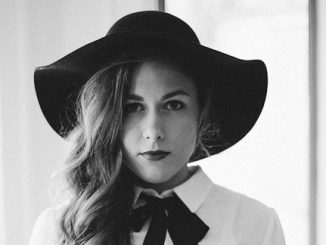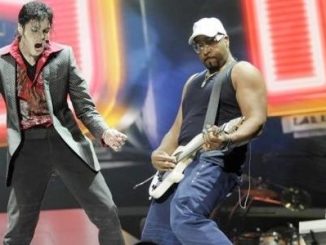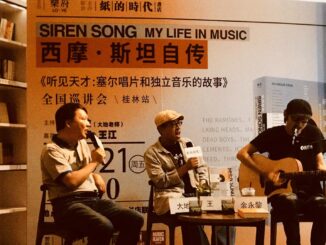
Jaye Shaw has been playing drums for about fifteen years. She studied drum set performance in her hometown, Chicago, at Columbia College, and also graduated from the Musician’s Institute in their drum program. She’s played in numerous bands and as a hired gun for various musicians and artists. (See her above in the music video for Persian artist Idin.) Shaw plays mostly rock, pop, and hip-hop styles, and also percussion (conga, bongos, etc). When not drumming, she’s pursuing a degree in criminology.
Women are underrepresented in the percussion world. we aims to recognize, celebrate, and inspire female percussionists of all stripes.
Where do you live?
Los Angeles, California.
What kind of gear do you use? What’s your setup?
I play a five-piece Yamaha stage custom maple; DW single and double pedals; Soultone cymbals (two sets of hi-hats, three crashes, a splash, and a Gospel ride); Meinl bongos, conga, and other various hand percussions; Alesis electronic kit with Pintech mesh heads; CooperGroove 5B sticks.
Do you have endorsements?
Yes. Soultone cymbals and CooperGroove drumsticks.
What bands/groups do you perform with, if any?
I’m currently just doing for-hire gigs. I play mostly rock, pop, and funk genres with various artists and bands over the years.
Next month I will be learning songs to perform with Mitchell Coleman, Jr. and his band in the fall.
What led you to your instrument? What’s your origin story?
Although my school had some music classes, with recitals and plays, we didn’t have any after school programs for music. At around ten years old, a girlfriend told me she was in this marching band project after class, separate from our school. I was intrigued and she showed me her snare drum and books during a sleepover.
Originally, I wanted to play violin, but at the time my family couldn’t afford the lessons, so I played mostly recorder and smaller percussion instruments in class and in our plays. Eventually my family got me a guitar and lessons, but I was more drawn to drums and percussion, so I didn’t stick with it (pun intended).
Who is your favorite drummer and why?
I have a lot of drummers that I’ve admired over the years. A few are: Bonham, Stubblefield, Menza, Ulrich, Lombardo, Blackman, Carrington, and Mikkey Dee.
How do you practice? Do you have a routine?
I tend to do rudimentary exercises and play along to songs I know from slower tempos to faster. I don’t have a particular routine I follow at all times.
Are there any specific playing tips or techniques, or advice, exercises, or discoveries you’d like to share with Drum readers?
I’d say just play what you love and try to remember that it’s for the love of music first. It’s also good to branch out of your comfort zone and learn new styles of music, or a different instrument.
What’s something you believe about drumming or music that other people think is crazy?
Music can be very powerful when it comes to emotions and how people can react to it. Music can make you cry, be angry, relaxed, or happy.
As artists, the goal post for “success” is always moving. There’s not one “I made it!” point. How do you think about and define success?
Like many musicians I used to think that getting signed with a famous band was success. Now, I believe that not everyone has the same idea of success, whether that be musically, or life in general. Musical success can be as simple as learning a new song. For me, I hope to have more successful opportunities to drum throughout my life.
Do you have any quotes or sayings that you live by?
A woman once told me, “Drumming is what you do, not who you are.” I’d say as humans, we are made up of much more than what happens within a 24-hour day.
When you sit down to make music and are starting with a blank canvas, what’s your process like?
Listen to the other instruments first and get a feel for the song, then try to create a beat that will compliment the song and vocals.
How important is failure in making music/performing?
Some failure is a way to learn or improve musically in the future.
Any advice for girls contemplating getting started and making it in this arena?
Actually, I think female drummers have gotten more representation and high-level opportunities in the past decade, but still not as much as the guys. The internet has played a helping hand in this. My advice is to simply start playing whenever you can, and hone your skills with time and patience.
If you had to put together a school or resources for would-be drummers, what would the training include?
A combination of some rudimentary lessons, but the focus should be on just playing songs and perfecting staying in time. I’d also include hand percussions as well as drum set.
Where else to find Jaye
YouTube
And, check out her drmher company, which is also in support of female drummers, and where she wants to “eventually incorporate musical education trips to learn various percussion styles with groups of drummers.”
Source : Woman Crush Wednesday (#WCW),




